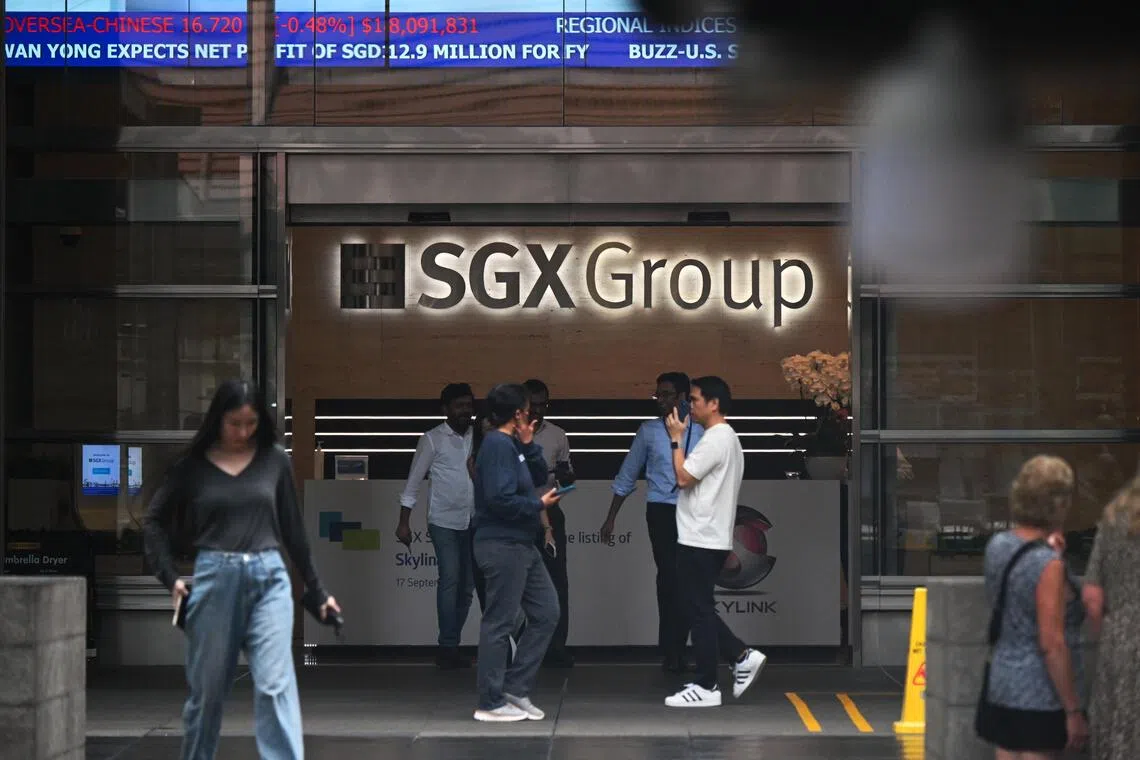SGX eyeing depository receipts for more overseas markets as it launches Indonesian offerings
Sign up now: Get ST's newsletters delivered to your inbox

Indonesia is the second Asean market to have Singapore depository receipts after Thailand.
PHOTO: ST FILE
Follow topic:
- SGX launched Singapore Depository Receipts (SDRs) for three Indonesian blue-chip firms on Oct 16, offering retail investors simplified access to Indonesian stocks in Singapore dollars.
- SGX plans to expand SDR offerings to Vietnam by 2026 and is exploring SDRs for developed markets like the United States and Australia, according to Serene Cai.
- The Indonesian SDRs provide "specific targeted investing" options, complementing existing exchange-traded fund options and enhancing regional connectivity.
AI generated
SINGAPORE – Retail investors in Singapore can look forward to trading stocks in more overseas markets in the local currency as the Singapore Exchange (SGX) expands its offerings to simplify access to them.
Next up could be Vietnam in 2026, following the launch on Oct 16 of Singapore depository receipts (SDRs) linked to three Indonesian blue-chip companies.
SGX is in talks for the Vietnam leg of SDR offerings, said its head of securities trading Serene Cai.
Indonesia is the second Asean market to have SDRs after Thailand.
Ms Cai said that besides Vietnam, “there has been market interest in SDRs on developed markets like the United States and Australia”.
SDRs, which are similar to American depository receipts in the US, provide a way for Singapore investors to invest in the stocks of foreign companies through the SGX.
There are 26 SDRs on the exchange, comprising 10 Thai SDRs, 13 Hong Kong SDRs and the three new Indonesian SDRs.
The exchange started with Thai SDRs in May 2023 and Hong Kong SDRs in October 2024. Like the Thai and Hong Kong SDRs, the Indonesian ones are issued by Phillip Securities.
The three underlying blue-chip companies – Bank Central Asia, telco Telkom Indonesia, and food and beverage manufacturer Indofood – are part of an index that tracks the performance of the 30 largest and most liquid companies in Indonesia.
Ms Cai noted that these SDRs mean greater access to the market for investors here, since not many brokers offer trading in Indonesian stocks.
“We look at the SDR programme as a way to bring the world to Singapore,” she added.
Poems, Phillip Securities’ online trading platform, is one of the few that enable trading of Indonesian equities.
Mr Luke Lim, managing director of Phillip Securities, said the broker has observed “some demand” from high-net-worth clients, who generally have slightly higher risk appetite or are familiar with Indonesian businesses.
Mr Lim noted that the conditions are now favourable as retail participation grows. “There is enough liquidity for foreign investors to start coming in,” he said.
Some retail investors that The Straits Times spoke to said they would prefer to invest more broadly instead of into individual Indonesian stocks because they “do not know much about the companies”.
Indonesia is included in the MSCI AC Asia Pacific ex Japan Index, the MSCI AC Asia Pacific Index and the MSCI Emerging Markets Index.
These investors can invest in the market by buying into an exchange-traded fund that tracks any of the three indexes.
Ms Cai noted that there are other investors who may want to do their own stock picking and manage their portfolios by themselves. The SDRs thus present an option for those who want to do more “specific targeted investing” into individual stocks.
Telkom Indonesia is the largest telecommunications and network service provider in Indonesia, the equivalent of Singtel in Singapore.
Telkom is also the parent of Telkomsel, the largest cellular operator in the country.
Mr Bret Matthew Ginesky, vice-president of investor relations at Telkom Indonesia, said that Indonesian sovereign wealth fund and majority shareholder Danantara is now trying to restructure the company.
The restructuring will look into ways to streamline Telkom’s business and explore avenues to unlock value through the spin-off of assets, such as its data centres or fibre assets.
If these initiatives bear fruit, Telkom will become a business focused purely on the telecommunications industry and digital economy, he noted.
Meanwhile, Bank Central Asia (BCA) ranks among the top four banks in Indonesia. Three are state banks and BCA is the only privately owned bank among them, noted its head of investor relations Rudy Budiardjo.
BCA’s strength, he noted, is in transaction banking, where it has a long-term track record since the 1970s.
Transaction banking is also a business line that is less sensitive to industry cycles, Mr Budiardjo added.
SGX chief executive Loh Boon Chye said the launch of the three Indonesian SDRs marks another milestone in the exchange’s move to strengthen regional connectivity.
He added that he is confident this will catalyse further cooperation between regional exchanges and help build a vibrant, more connected Asean capital market.
The product class received a boost when the regulator, the Monetary Authority of Singapore (MAS), announced in July that the listing grant under the Grant for Equity Market Singapore Scheme will also cover depository receipt issuance.
Issuers of SDRs and foreign depository receipts with underlying Singapore stocks will get $40,000 for each depository receipt, MAS said.


